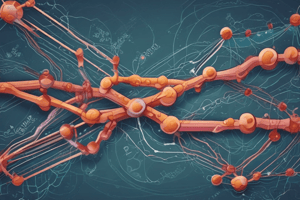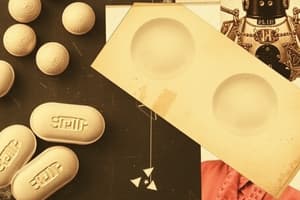Podcast
Questions and Answers
What is the major starting material for the synthesis of eicosanoids?
What is the major starting material for the synthesis of eicosanoids?
- Leukotriene A4
- Prostaglandin E1
- Cyclooxygenase
- Arachidonic Acid (correct)
Which enzyme is responsible for producing leukotrienes from Arachidonic Acid?
Which enzyme is responsible for producing leukotrienes from Arachidonic Acid?
- Cyclooxygenase
- Lipoxygenase (correct)
- Phospholipase A2
- Cytochrome P450
Which of the following statements best describes COX-1's role in the body?
Which of the following statements best describes COX-1's role in the body?
- It produces prostanoids that promote inflammation.
- It is primarily found in white blood cells.
- It generates prostanoids that are beneficial for protecting gastric integrity. (correct)
- It is expressed only during stress responses.
What type of compound is misoprostol classified as?
What type of compound is misoprostol classified as?
Which of the following eicosanoids is primarily involved in mediating inflammation in asthma?
Which of the following eicosanoids is primarily involved in mediating inflammation in asthma?
Which prostanoid is primarily synthesized from COX-2 in response to stress?
Which prostanoid is primarily synthesized from COX-2 in response to stress?
What is the role of phospholipase A2 in eicosanoid synthesis?
What is the role of phospholipase A2 in eicosanoid synthesis?
Which product is NOT formed from the action of Cyclooxygenase enzymes on Arachidonic Acid?
Which product is NOT formed from the action of Cyclooxygenase enzymes on Arachidonic Acid?
What is the role of prostaglandins (PG) in platelet function?
What is the role of prostaglandins (PG) in platelet function?
What major biological role does thromboxane (TXA) play in the vascular system?
What major biological role does thromboxane (TXA) play in the vascular system?
Which prostaglandins are primarily associated with inflammation?
Which prostaglandins are primarily associated with inflammation?
What is the mechanism by which corticosteroids inhibit eicosanoid synthesis?
What is the mechanism by which corticosteroids inhibit eicosanoid synthesis?
How do leukotrienes affect immune response?
How do leukotrienes affect immune response?
Which eicosanoid is used to prevent NSAID-induced peptic ulcers?
Which eicosanoid is used to prevent NSAID-induced peptic ulcers?
What effect does chronic inhibition of the kidney COX enzyme have on the kidneys?
What effect does chronic inhibition of the kidney COX enzyme have on the kidneys?
Which fatty acid sources provide biologically inactive eicosanoids?
Which fatty acid sources provide biologically inactive eicosanoids?
Which of the following is described below:
-polyunsaturated long-chain fatty acids
- produced in a wide range of tissues, highly bioactive
- mediators of inflammation, redness etc.
Which of the following is described below:
-polyunsaturated long-chain fatty acids
- produced in a wide range of tissues, highly bioactive
- mediators of inflammation, redness etc.
Which of the following is described below:
-prostaglandins, thromboxane, prostacyclin are in this group?
Which of the following is described below:
-prostaglandins, thromboxane, prostacyclin are in this group?
Match each arachidonic acid enzyme to its products
Match each arachidonic acid enzyme to its products
What is the role of COX-2?
What is the role of COX-2?
COX-2 is inducible and its expression requires a stimulus.
COX-2 is inducible and its expression requires a stimulus.
What do the letters A, B, G, H, etc. for prostaglandins define?
What do the letters A, B, G, H, etc. for prostaglandins define?
What do the subscripts for prostaglandins such as PGE1 count?
What do the subscripts for prostaglandins such as PGE1 count?
Which of the following is a PGE1 derivative used to relax smooth muscle and to treat impotence?
Which of the following is a PGE1 derivative used to relax smooth muscle and to treat impotence?
Which of the following is a PGE1 derivative, cytoprotective prostaglandin used to prevent peptic ulcer?
Which of the following is a PGE1 derivative, cytoprotective prostaglandin used to prevent peptic ulcer?
Where is LOX mostly found in the body?
Where is LOX mostly found in the body?
Match each body system to the effect PGs and TXs have on it
Match each body system to the effect PGs and TXs have on it
Match each body system to the effect PGs and TXs have on it
Match each body system to the effect PGs and TXs have on it
Which of the following plays an important role in white cell function and immune response by activating white cells and promoting inflammation?
Which of the following plays an important role in white cell function and immune response by activating white cells and promoting inflammation?
Which of the following is the gold standard for eicosanoid synthesis, primarily through inhibition of the phospholipase enzyme that releases arachidonic acid from cell membranes?
Which of the following is the gold standard for eicosanoid synthesis, primarily through inhibition of the phospholipase enzyme that releases arachidonic acid from cell membranes?
Which of the following stops prostaglandin synthesis by inhibiting the COX-1 and COX-2 enzymes?
Which of the following stops prostaglandin synthesis by inhibiting the COX-1 and COX-2 enzymes?
What is indomethacin?
What is indomethacin?
Which of the following drugs is used to promote uterine contraction and induce abortion?
Which of the following drugs is used to promote uterine contraction and induce abortion?
Which of the following prevents aspirin-induced peptic ulcers?
Which of the following prevents aspirin-induced peptic ulcers?
What substance from sunflowers and corn oils can act as an alternative for arachidonic acid?
What substance from sunflowers and corn oils can act as an alternative for arachidonic acid?
Linoleic acid produces biologically active eicosanoids.
Linoleic acid produces biologically active eicosanoids.
What do cold water fish oils contain?
What do cold water fish oils contain?
Why should misoprostol never be given to a preterm woman?
Why should misoprostol never be given to a preterm woman?
Match each drug to its clinical use
Match each drug to its clinical use
Match each hypertension drug to its description
Match each hypertension drug to its description
Which plant produces salicylic acid?
Which plant produces salicylic acid?
Which of the following drugs is more selective for COX-1?
Which of the following drugs is more selective for COX-1?
Which of the following drugs is more selective for COX-2?
Which of the following drugs is more selective for COX-2?
Which of the following is used to induce abortion or to control postpartum bleeding?
Which of the following is used to induce abortion or to control postpartum bleeding?
Flashcards
Eicosanoids
Eicosanoids
A group of bioactive compounds produced by most cells and tissues, derived from polyunsaturated fatty acids like arachidonic acid, that are involved in various physiological processes, including inflammation.
Prostanoids
Prostanoids
A specific type of eicosanoid synthesized from arachidonic acid via the cyclooxygenase (COX) pathway.
Arachidonic acid (AA)
Arachidonic acid (AA)
The major precursor for the synthesis of eicosanoids, found in cell membranes, and released by the enzyme phospholipase A2.
Cyclooxygenase (COX)
Cyclooxygenase (COX)
Signup and view all the flashcards
COX-1
COX-1
Signup and view all the flashcards
COX-2
COX-2
Signup and view all the flashcards
Alprostadil (PGE1)
Alprostadil (PGE1)
Signup and view all the flashcards
Misoprostol (PGE1 derivative)
Misoprostol (PGE1 derivative)
Signup and view all the flashcards
What is the primary function of Thromboxane A2 (TXA2)?
What is the primary function of Thromboxane A2 (TXA2)?
Signup and view all the flashcards
How do Prostaglandins (PGs) impact blood vessels?
How do Prostaglandins (PGs) impact blood vessels?
Signup and view all the flashcards
What is the main function of Prostaglandins (PGs) in the kidney?
What is the main function of Prostaglandins (PGs) in the kidney?
Signup and view all the flashcards
What is the primary role of Prostaglandins in inflammation?
What is the primary role of Prostaglandins in inflammation?
Signup and view all the flashcards
How do corticosteroids suppress eicosanoid production?
How do corticosteroids suppress eicosanoid production?
Signup and view all the flashcards
What is the primary mechanism of action for NSAIDs like aspirin and ibuprofen?
What is the primary mechanism of action for NSAIDs like aspirin and ibuprofen?
Signup and view all the flashcards
How does dietary linoleic acid impact eicosanoid production?
How does dietary linoleic acid impact eicosanoid production?
Signup and view all the flashcards
How do omega-3 fatty acids from fish impact eicosanoids?
How do omega-3 fatty acids from fish impact eicosanoids?
Signup and view all the flashcards
Study Notes
Eicosanoids, Prostaglandins, Thromboxanes, Leukotrienes
- Eicosanoids are polyunsaturated fatty acids produced in tissues. They are highly bioactive and mediate inflammation and redness.
- Prostanoids are a type of eicosanoid including prostaglandins, thromboxane, and prostacyclin.
- Arachidonic Acid (AA) is the main starting material for eicosanoid synthesis. It's found in cell membranes.
- Phospholipase A2 removes AA from cell membranes.
- AA is then enzymatically converted into various products. These include epoxyeicosatrienoic acids (EETs), leukotrienes, lipoxins, prostaglandins, prostacyclin, and thromboxane.
- These products are produced by enzymes like Lipoxygenase (LOX) and Cyclooxygenase (COX).
COX Enzymes
- COX-1 is found in most cells and produces prostanoids vital for bodily functions, including protecting the stomach lining and kidneys.
- COX-2 is an inducible enzyme, meaning its production is triggered by stimuli (stress, cytokines, tissue injury) and results in the production of prostanoids that cause inflammation.
- Non-steroidal anti-inflammatory drugs (NSAIDs), like aspirin and ibuprofen, inhibit COX enzymes, thus reducing inflammation.
Products of COX Enzymes
- Prostaglandins are involved in various functions, including uterine contractions during childbirth, blood flow regulation, and influencing blood clotting.
- Thromboxanes promote platelet aggregation (blood clotting).
- Prostacyclin prevents platelet aggregation.
Prostaglandins as Drugs
- Alprostadil is a PGE1 used for smooth muscle relaxation and treatment of impotence.
- Misoprostol is a PGE1 derivative used to prevent peptic ulcers. Dinoprostone is another PGE analog used for uterine contractions.
Lipoxygenase (LOX) Products
- Leukotrienes are LOX products mainly found in white blood cells.
- Leukotrienes are important mediators of inflammation (e.g., in asthma).
Biological Effects of Prostaglandins and Thromboxanes
- Prostaglandins and thromboxanes (TXs) affect various tissues. They can cause vasoconstriction (narrowing of blood vessels) and vasodilation (widening of blood vessels).
- Prostaglandins and TXs are involved in smooth muscle contraction and relaxation in the gastrointestinal tract and airways.
- TXA is a potent vasoconstrictor.
- PGs promote vasodilation.
Inhibition of Eicosanoid Synthesis
- Corticosteroids are the gold standard for inhibiting eicosanoid synthesis, largely by inhibiting phospholipase enzymes.
- NSAIDs like ibuprofen and indomethacin inhibit COX enzymes, preventing prostaglandin production.
Dietary Manipulation of Arachidonic Acid (AA)
- Linoleic acid, found in sunflower and corn oils, can act as a substitute for AA. However, the eicosanoids produced aren't identical.
- Cold-water fish oils contain omega-3 fatty acids which can also affect eicosanoid production.
Other Notes
- Aspirin inhibits platelet aggregation by inhibiting PG synthesis.
- Kidney function relies on prostaglandins for various processes, and decreased PG production can negatively affect kidney health.
- Prostaglandins play critical roles in the central nervous system (CNS), including fever responses and neurotransmitter release.
- Eicosanoids are linked with inflammation, bone remodeling, and various other physiological responses.
Studying That Suits You
Use AI to generate personalized quizzes and flashcards to suit your learning preferences.




